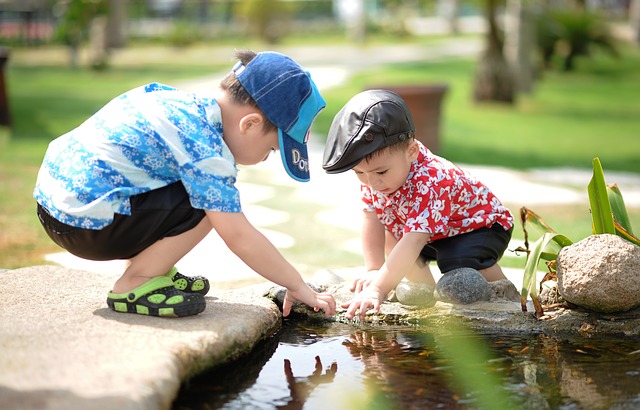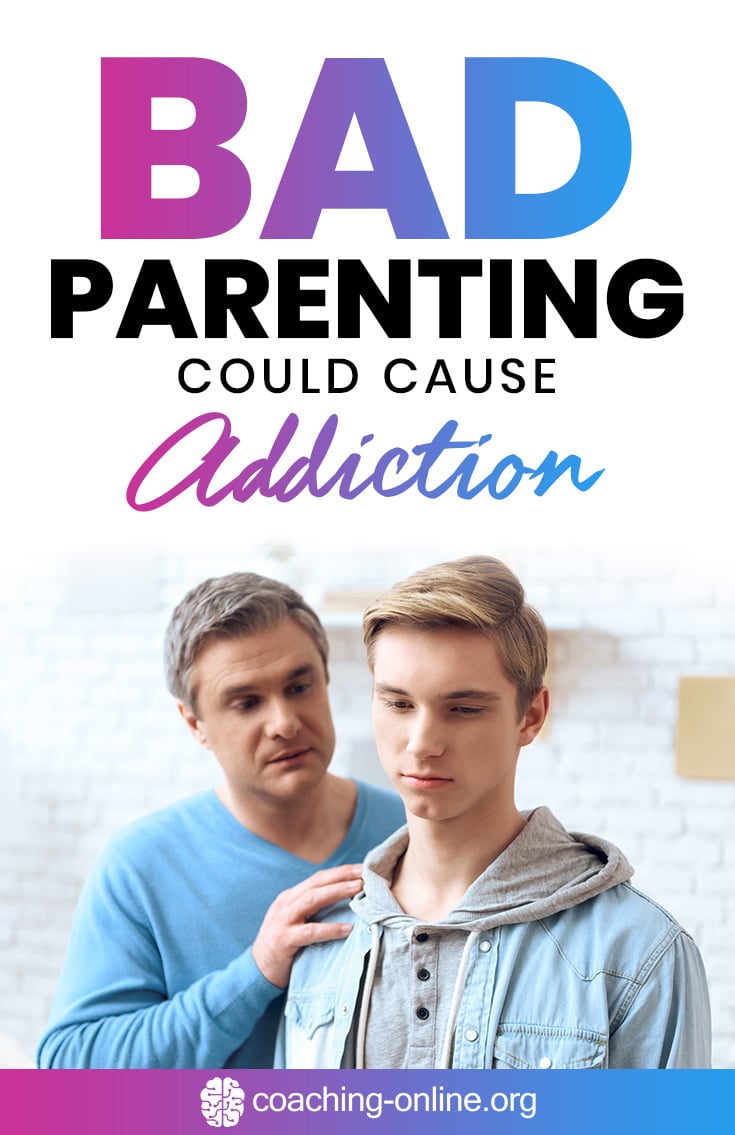Bad Parenting
Do you too worry about the right parenting methods?
Good news is you can avoid the worst mistakes if you follow the advice of experts.
In today’s article, you will find a series of advice by well-known brain-scientists, psychologists and other experts in the field.
Let’s jump right in.
- Six Childhood Experiences that Could Cause Addiction
- Pain in the Center of Dependence
- Addiction is the Cancer of the Soul
- #1 – The Lack of Satisfaction of Basic Needs
- #2 – Conditional Love Experience
- #3 – The Overprotective Behavior of Parents
- #4 – Lack of Free Play Leading to Boredom
- #5 – The Performance-driven Nature of Our Society
- #6 – The Fear of Failure that Parents Pass On to Children
- Bad Parenting – Final Words
Six Childhood Experiences that Could Cause Addiction
Addiction has been named as cancer that eats away the soul of the addict. It is rightly so, considering the tragic consequences of its destructive force.
Our general view of drugs as the cause of addiction has led to an age-long global war on drugs but have we been doing things wrong? Just maybe! While individuals may become dependent on drugs, the drug itself is most often not the root cause of the addiction in the first place.
The causes often boil down to imbalances in an individual’s life which most times can be traced back to certain painful childhood experiences caused by bad parenting. These experiences are often events of physical and emotional abuse along with some other less obvious triggers.
Gabor Maté, the famous Canadian physician who has studied addiction and anti-dependency for decades opines that even though some dependencies may have been caused by trauma and abuse, it is no doubt they all have their roots in painful experiences.
Look:
Bad Parenting – Pain in the Center of Dependence
Gabor Maté is convinced that pain is central to any addiction whether the dependency has to do with drugs, the internet, gambling, work, anorexia, buying, and every other form of addiction.
“The wound may not seem very deep and the pain is not unbearable – maybe the injury is even completely hidden – but it’s there”
, Maté opined. Eventually, those who feel the pain will try to escape it.
Addiction is the Cancer of the Soul
Ralf Schneider, the German psychotherapist puts it that
those who are emotionally burdened look for relief and find this among others in alcohol, drugs or medications. (Ralf Schneider)
Because everyone deals with these injuries in fairly different ways, it is not everyone who has had a painful childhood experience that will develop an addiction.
However, there are experiences in childhood, caused by bad parenting, that have led to dependency or addiction in individuals. If we as parents are aware that certain parenting methods can cause harm, it could be avoided early on. Below, we’ll discuss six of these painful childhood experiences through bad parenting, that could cause harm.
Bottom line?
#1 – The Lack of Satisfaction of Basic Needs
The same way toddlers need to satisfy hunger and thirst is the same way they’ll need love, protection, and security. A lack of these basic needs will propel the baby into an emergency situation. The baby then becomes dependent on the parents with no language to communicate.
Take for example our general belief that babies learn to fall asleep by themselves which of course is not true. Since these babies are yet to learn from experience, they’d usually give up, making them scream. However, this can prove very harmful.
Babies and toddlers are unable to draw conclusions from their parents’ behaviors because they are not that mentally developed. Rather than to manipulate or annoy their parents, they cry because they have a problem that needs to be solved.
Some children would fall asleep only near their parents because that is where they feel safe enough. Ordinarily, children are best protected and safest in here.
But children cry out with no reaction from parents, it leads to stress. The release of cortisol, a stress hormone, is known to affect brain development as well as the central nervous system. This situation affects both physical and mental development.
When the child’s cries are being continuously ignored, pain and insecurity sets in. Extreme cases may even lead to trauma. Other problems may then arise, from sleep disorders to anxiety and depression, as well as dependencies and several addictions. According to Schneider, failure to meet these basic needs which can result in long-term stress and helplessness can also affect drug preparedness. It is then obvious that this early stress can create a change in the brain.
I can’t emphasize this enough:
#2 – Bad Parenting – Conditional Love Experience
While most parents will not hesitate to answer that they love their children unconditionally, only a few really do this as it should be. According to the famous German brain researcher, Professor Gerald Huether, only a few children get to be loved unconditionally by their parents. Yet, this is what he considers the foundation for a happy childhood.
A child has to feel that it is right the way it is. That it is loved for its own sake and unconditionally. This is the most important experience every child needs. (Gerald Huether)
Affection in Exchange for Obedience
It is quite unfortunate that many children feel their parents would love them more should their grades get better or they become more kind and helpful. As we’ve known, children are happier when they do not feel they have to make an effort so their parents can love them.
Till today, it is still very common to see parents, as well as educators, showering more love and affection towards children when they behave the way they expect them to do. While most people do not know, this behavior that may seem like an encouraging thing to do could prove very damning and hurtful.
Children are naturally wired to be dependent on the affection of their parents. It may become a big problem if and when they begin to feel that this love is not unconditional.
Bad Parenting – The Sensitive Band of Love
Children are born with a natural attachment to their parents. There is a sensitive natural bond of trust between both parties as the children both love and need their parents.
Huether puts it through that when children are made the object of their parents’ expectations, goals, measures, and ideas, this bond then becomes threatened. This, according to the Professor, also comes along with very big pain.
The Pain of the Imperfect Child
The pain of the imperfect child is measurable. Science has proven that this pain is synonymous with what the body feels in the case of physical pain. It impacts the same areas of the brain that are affected by physical pain. The way we react to this pain as a child varies from one person to the other.
While some people will spend the rest of their lives making efforts at being loved and accepted, some turn to the use of analgesic substances to heal this pain caused by bad parenting.

Now:
#3 – The Overprotective Behavior of Parents
Schneider further explains, if you ask addicts what mental causes their substance consumption has, one would get innumerable answers. Prevalent among these reasons are those whose aims come down to getting more courageous and lowering their inhibitions through the use of drugs to reduce anxiety.
Looking at it, the willingness to take risks and face challenges fearlessly is largely shaped in childhood. Therefore, children must be given the chance and allowed to fall. They have to play unattended and even put themselves in danger to an extent to understand their own boundaries.
Gerald Huether said; No child can learn how to get up if it never falls. No child can learn to walk when the stones are cleared away.
As hard as it may seem, being too protective is bad parenting and would mostly lead to uncertainty even when parents feel they are doing their child a favor.
You might be wondering:
#4 – Lack of Free Play Leading to Boredom
Eckhard Schiffer, the bestselling author of the German book ‘’Warum Huckleberry Finn nicht süchtig wurde” (Why Huckleberry Finn Didn’t Get An Addiction) explains that a vivid imagination could be a very effective defense against the onset of addictions.
From his years of working with addicts, Schiffer found out that boredom may be the precursor to dependency later on in life. Many patients would resort to using narcotics to escape an inner void and emptiness.
Schiffer opines that this emptiness and its accompanying boredom arise from the lack of imagination which in turn is caused by a lack of free play during childhood. This problem plagues more and more children in today’s society.

Bad Parenting – The Attack on Free Game
Two things usually affect a child’s free play. The first being the unavailability of time to play because parents would rather want their children focused on sports, language, music and other courses besides school.
Secondly, the game often loses its free flow and spontaneity as it is less played for the sake of playing and more to achieve a specific result. We tend to interfere in children’s free game with our way of showing them how it works better.
Both behaviors are bad parenting.
Creativity is Strengthened by Freedom
On the other hand, a child’s creativity and imagination would usually arise where the child is allowed to be free. This child whose free play is not hindered will not feel bored as he will always find new ways to keep himself engaged.
This creativity will help children all through their lives to find answers to some of life’s most complex problems. They’d be able to think outside the box since their imagination would not be restricted by others. They’ll be protected from the boredom and emptiness that sets the stage for addiction.
It gets worse:
#5 – The Performance-driven Nature of Our Society
Our society today is performance-driven and children are subjected to this with enormous tasks that the society expects them to perform. They’ll need to get ready for school in the morning, concentrate as much as possible, and participate in all subjects.
They’ll be expected to handle homework as well as other extracurricular activities thereafter. Children at times, often have to do as much work as adults.
There’s also that fear about falling out of line, falling short of expectations, or inability to keep up with the society’s fast pace. They are taught right from kindergarten that only the ones who work hard can be successful, and that only successful ones can be happy.

Bad Parenting – Children Having to Work and Perform
We instill into our children that they need good grades to keep up with society. If they come home with a three, we let them realize how they could have made a two if they’ve just put in a little more effort.
While we are at this, it comes across to these children that a five on the result sheet would disappoint us a lot while better grades would make us like them better.
Schneider wrote in his ‘’Suchtfibel” (Addiction Fagula) that 36 percent of parents are willing to give their 10-year-old children drugs to improve concentration. (Ralf Schneider, Suchtfibel, 2012)
However, this comes at a price as the highest proportion of drug consumption on a regular basis was seen among the good students.
He further explains how such families that place greater emphasis on these career and cultural demands seems to continuously find inner peace.
They’d often compare their children’s performances to each other and the scene here is dominated by competition and market value. What is my market value? How do I kill my competitors? (Ralf Schneider, Suchtfibel, 2012)

How the Wrong Sense of Oneself Poisons the Soul
The meritocracy of our society terms those who cannot compete as losers. These people who fail to live up to expectations would often try to blend in to create that false sense of self so as not to be excluded. Unfortunately, this is addictive because of the lack of inner peace.
The resulting stress, as well as the constant pursuit of ever-eluding success and happiness, poisons the soul, much more for children as it does for adults. While it may appear unnoticeable, this feeling of not being good enough causes great pain.
This is often the cause of common emotional and mental conditions like depression and burnout which in some individuals can trigger the need for distraction and anesthesia.
#6 – The Fear of Failure that Parents Pass On to Children
It takes a lot of work to raise a child today and many parents have to work under this pressure. We often fear our children failing in certain aspects of life. We are pressured by the demands of this modern meritocracy and how our children will fit in.
So as to protect and guide these children, many parents take up active roles in their lives.
They plan their free time, interfere in their game and build up a list of expectations they want their children to live up to. While they appear to be doing it out of love, fear is also another reason behind it.
Parents at times may stray away, losing sight of the child’s interest while keeping their own fear in check. This parental security then becomes a stranglehold which can appear damning and consequential in the child’s struggle to adjust later on.
Performance as the Remedy for Fear
Performance as a magic remedy for fear is already demanded by children today, and that means a significant restriction of autonomy and one’s own path, Schiffer explains.
Our society configures children to think that as long as they work harder, they will not go under. Children are therefore prevented from deciding for themselves, are unable to discover and experience their environment, and further unable to follow their own interests at their own pace. This ultimately leads to a loss of attachment.
Bad Parenting – Final Words
This loss of attachment has a lot of consequence on children when they become adults. To acquire this inner experience, they become increasingly reliant on a medium to experience something.
This reliance varies from individuals and can range from drugs to internet, to gambling, work, and other types of addiction.
What parents should understand is that children need more open spaces and freedom than just good grades and impressive CVs.
Children need to be given enough space for adventure and self-development. Just so you know, they should also be given the chance to fail, too.
This article is inspired by a German article of Gina Louisa Metzler, 2018 on huffingtonpost.de
If you feel you need further guidance on parenting, consider contacting a counseling service. Also, online coaching can be helpful.
Important Note
Every article I write is intended to help you with:
- questioning and reflecting on your own view of the world
- understanding why you are looking at the world like you do
- finding different perspectives to view situations from different angles, and
- going on a meta-level and reflecting on the consequences of your view
However, with every sentence I write, I create another view of how things “really are”. Even if I do this with the best intentions, please critically examine if this construction of the reality is helpful for you as an individual person in your own special situation.
Not My Intention
If, while reading this article, on your side arose some negative feelings like regret, self-criticism or guilt, this is definitely not my intention. STOP it, please! ?
Always remember that we always act out of the best of our knowledge and belief. Put your focus on the future, not in the past, and think about what you can improve to do better.

